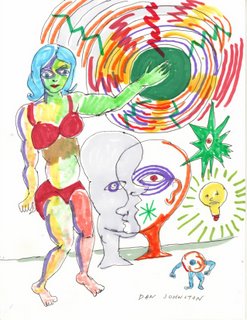

So this is the third (and for the time being, final) part of the posts I began
here and
here, in which I’ve been thinking about why I always feel slightly cut off from fully being able to experience the feeling of love. As in, not be able to quite. get.
there. “There” being a place where I’m overwhelmingly sure I love the person beyond any reasonable doubt, or, in the case of romantic relationships, be able to say to myself with full certainty that I am “in love.”
I wrote at the end of the second post that I think in order to understand this, I really need to look back at the roots of how “love” was taught to me. And of course, as with everything, that starts with childhood and family upbringing.
Since some of the below may end up sounding pretty harsh, I will preface all of this by saying I wasn’t constantly miserable growing up (perhaps because at the time I didn’t know there was any alternative, so just went with what I had). I had a nice, comfortable childhood that many people on the outisde would envy. I laughed. I had good times with my family. I wasn’t abused by a long shot, and my family has done some wonderful, supportive things for me. In short: I do think my parents loved me, in the best way they knew how. I just think they had some faulty messaging about love, themselves, which it’s become evident they transmitted to me, much as I thought all these years that I was fighting it.
Okay, on with it.
I once went to a seminar where they were explaining how to utilize one of those personality assessment tools they often use in corporations. The presenter there said there were generally two types of messages people got from their families: 1) “You help the family by learning how to help yourself,” (be independent) or 2) “You help the family by learning help everyone else in the family” (be interdependent).
In general, I hate when things are boiled down to two options. (I like to say, “The world has two kinds of people: those who think the world can be divided into two kinds of people, and those who don’t. Heh.) But in this case, my family falls solidly into category #2.
In my family, “love” meant (and still means) giving. You were expected to think about what those around you needed, and how to give it to them. And if your individual need meant that you were inconveniencing someone else or everyone else, you were supposed to give up that need for the betterment of group unity. If you insisted on seeing your need met despite the other’s inconvenience or discomfort (whether actual or merely imagined), you were “selfish,” “ungrateful,” or were subjected to hearing things like, “We do so much for you, and you can’t do this one thing to make us happy?” The fact that my parents “lived first for their children” was pointed out fairly often in word and deed. We kids were expected to give recompense for this sacrifice by making my parents happy via behaving “well” (as defined by them). In essence, we were supposed to be model children.
Love was most freely given out when you achieved something toward this goal--when you performed well, and according to expectation. Though it was clear my parents never stopped loving me or my sister regardless of what we did, there was
nothing that was rewarded with as much affection in my home as excelling publicly in the areas that my parents felt would raise the worth of the family “profile” in the eyes of those around them. Doing well in school. Having neighbors praise my parents for us girls being so smart or responsible or pretty or “good” or “nice.” Having lots of “appropriate,” "nice" friends. Getting into a "good" colelge. Getting a “respectable” career, that paid appropriately. Getting a “respectable” boyfriend, who also had a respectable career, and who would eventually ensure you ended up respectably married. Having children. You get the picture.
When we followed the path of what my parents had defined as the “right way” to be, and succeeded at some marker of significance they’d set up in their minds, we were rewarded with much affection and celebration. We were publicly praised and held up for admiration. When we deviated from their idea of the norm (a.k.a., “did poorly”), the information was hidden from others as if it was shameful if at all possible, and if it was too obvious to hide, it was presented to others with, "Of course
I don't think it's right, look at how misguided she is/how she's hurting us" eyerolling or sadness, depending. We'd also be questioned incessantly about our "bad" choice and why we'd made it/continued to do it, and were often criticized incessantly about it as well. We were told about others’ children who were doing better by taking the other route. In general, we were made to feel guilty, until we felt entirely miserable. And then, once that was achieved, we were told, “See, the way you’re choosing to live your life is making you unhappy. We just want you to be
happy.” (And yes, at times both my sister and I have given in to this on some significant decisions, because it got to the point where it
did feel as if just to have the pressure stop would be easier than the constant judgement and guilt.)
So, lots of love and affection for being the perfect, 1950s-style clever but obedient, sweet, pure, blandly attractive, compliant, perfect middle-class girl. For anything else, "Well, you know we love you no mater what you do, but...how
could you
do that? What is
wrong with you? How could you do this to
us? Do you know what people will
say about you? Sigh...you used to be so pretty; why did you do that to yourself?" Etc., etc. So no, they never said, "bad choice = no love," but you see how subliminally, a kid
might start to think deviation from the mold meant blame and witholding of love. And how these kinds of judgmental questions could be used as manipulative methods of getting the person to leave behind the choice they made and get back on the "right track."
Along with that, there was a weird inequity going on in that we as kids were told (primarily by my mother, who was very emotionally needy) that love meant having no secrets. My mother set it up from early on that she was The Family Confidant who everyone had to come to to get their emotional needs met. Every emotion we ever felt needed to be shared with and processed through her. She stressed how important it was for families to help each other, and to tell each other everything. She was hyper aware of everything we were doing at all times, so that in a sense, even if we were in a closed room in the house, we never really had any privacy. She knew where we were and who with all the time when we were out of the home. And the minute an emotion crossed our face, it was leapt on and we were asked what we were feeling.
From the outside, this seemed nice to a lot of my friends, who often felt their parents didn’t really notice them and their needs all that much. And it was nice to have a mother who cared.
To an extent. But in my mother's case, it just went way over the line. For me, and I’m only beginning to realize the depth of this, it was often sheer torture. I had no mental privacy. At all.
(I feel both guilty and selfish having said that. "My mother tortured me by loving me too much." I know it sounds bizarre, and that some people who are reading this who had inattentive or emotionally absent mothers will say I'm a whiner and I don't know how good I had it. And I also know hearing this would hurt my mother and make her cry; and she'd be horrified I was saying this in public. But I'm sorry, it's true. Sometimes loving too much is damaging, too.)And yet, even as I was always getting this constant message that people who love each other share everything, my mother certainly didn’t do the same in return. She kept plenty of her emotional stuff to herself--which was appropriate, seeing as she was an adult and I was a child. But nonetheless, you see the inequity here. "Share everything" meant
my brain and heart were up for ownership; hers were not. And as such, she knew exactly what made me happy, sad, insecure, willing to help, unwilling to participate, etc. And, when she deemed it necessary (when I stepped out of line), she would use that knowledge to get me to do what she or my parents needed or wanted; or, as I got older, to at least make me feel horrible for doing it so that I couldn't enjoy it. And, it being imbalanced, I could never get enough ammunition to fight back in kind.
So you see what I was left with in terms of messages about love, moving into adulthood. Love meant:
- Meeting or exceeding expectation; if you aren’t perfect, you’ll never be fully loved.
- Always thinking of the other person before yourself.
- Giving up everything to that person should they need it, whether or not they requested it, and without expectation I could get full return.
- Giving up all secrets and vulnerabilities, which could then be used to manipulate emotions and behavior.
None of these definitions of love were EXPLICITLY stated during my childhood, of course. They were just instilled through learned behavior. Punishment and reward.
It’s really quite shocking how deeply such messages can get wired into you, even when you think you’re negating them.
These days, I’m asking myself, given this list above, is it any wonder, that I can only see people's behavior toward me in relationships as either punishment or reward--confirmation or negation of my loveability and value? Is it really all that surprising that I’m suspicious of ever letting myself be fully vulnerable to anyone? The whole mythology of giving all of yourself—sacrificing the core of your being—to the one (or ones) you love is very romantic, very noble. But is it actually really a loving act? I mean, in a way it’s a bit like emotional terrorism. If you want the kind of love that means each person must surrender themselves to the other; give up all that they are to make some kind of holy, spiritual fire-bond…well, isn’t that asking your lover, child, or friend to erase him or herself from being for you? Aren’t you in essence dehumanizing them?
In any case, that list sure as hell seems like one reason why I might have a pattern of picking out people who will fuck up, lie, cheat, or be unavailable to me. Choosing those people allows me to always be a little unsure, a little suspicious or worried; and that gives me a
reason why I can keep a little distance; why they can't demand I surrender myself because they have. Oh, I'll still feel sad that I can’t fully connect, too. But I think secretly maybe I don’t
want to fully connect, because that would mean surrendering myself to someone; and disappearing.
I’ve often said I’m far happier and saner out of a relationship than in it.
Now I realize why (I think). It’s because I don’t know how to fully love emotionally without loving sacrificially. And I don’t know how to accept emotional love from others without expecting sacrificial love from them to
prove the emotional love.
Because, yes, despite having thought I’d beat the pattern, I see now it’s beaten me.
I did things I thought would stop it. I eschewed the kind of traditional relationship my parents had, in both type of partner and in setup. I made friends with people completely outside of the types my family thinks are the “right” people. I’ve made choices for me alone that they still give me shit for even now, and I stuck to them.
BUT. Now I’m looking closely at what I do. And what I see is shocking and disappointing. Even after all that running away and trying to change, after years of hating how love had been defined in my household, after telling myself I'd
never be like them, it’s suddenly obvious that I’m still playing out the roles I’ve learned. When I’m in relationships, and even to some extent friendships, I over-give. It makes me ashamed to acknowledge this, by the way, because it seems so base and manipulative, and makes me seem so fucking needy and I HATE that. And I didn’t realize all this time, and that makes me feel stupid.
I don’t
consciously over-give to manipulate or fill a need. In my head, I'm doing it simply to show the person I like and value them. But often, people tell me I give so much that they feel overwhelmed and can’t possibly keep up or match my level of giving. They feel guilty; as if they OWE me, though I've never SAID they did. And yet, this sounds all too familiary to what I described above. I'm doing something that my parents did to get something in return. Am I subconciously doing it for the same reason? To be able to say, or MAKE the person to say to him or herself, "She does so much for me, how could I not do for her?"
So I may be doing it to get someone to give me something.
Looking back to how I was raised, I see this over-giving stuff is a dual-edged sword: I give because I’m afraid the person won’t give me the full measure of their love if I don't. And I give because I want to manipulate the person into giving me the full measure of their love. And yet it's a trap, because I’m making it so they CAN never equal up—which of course, once again, is also what was done to me. Ask for everything from the person, but never be satisfied with what they give, because it doesn’t meet your vision of how it “should” be given, or because there's always another thing that needs to be met. Appear to sacrifice everything, but don’t share all of your emotional information, lest the balance be toppled and you lose power and lose yourself.
I’m thoroughly ashamed I’ve been so blind. In love, I’ve become my parents; and the people I love, I’ve made the child me. I felt so confined as a kid; so trapped. Trapped by fucking love. Smothered. Unable to breathe. Unable to relax and
be myself. Not even time to think about who "myself" was; because the other person needed me so badly. And this is what I’m doing to other people. It make me want to hurt myself, it’s so awful to recognize. And it’s no wonder I’m such a fuckup at relationships. What rational adult would put up with that kind thing for long, regardless of how charming I may be on some levels?
So I'm playing the parent love role to others. And then, on the flip side, I choose men who will keep playing out the parent love role for me. I find men who will tell me they love me, will move the moon and stars for me, think I'm the hottest thing on the planet, whatever, but when it comes down to it, they just…can’t…commit. Too scared, too far away, too already involved with someone else. Or they tell me it’s been the best relationship they’ve ever had, but they’ve decided they really need to be with this other woman, who they always assumed was “out of their league” and they’d never thought they could ever get, and by the way did they mention they’d been fucking her already? Or they need huge amounts of help or nurturing or emotional support, and they suck all that out of me, so I’m so busy helping them fix their lives and succeed at their dreams, I can ignore ever dealing with my own—and they never notice I’m doing that, or that I even
have any dreams they ought to be supporting. And then once they’re “fixed,” they realize they're more "marketable and need to go out there and see if they can find someone who is, in their minds, more socially exciting and validating than even I am.
I’ll choose anyone who I have to give and care for until I disappear, and/or who will validate that I didn’t come up to standard, wasn't quite perfect enough to win his full measure of love and admiration.
Does all this feel like a trap inside a trap inside a trap, and I’m doomed no matter which direction I turn? Oh yes, it sure as hell does.
So.
How to love emotionally without loving sacrificially, and how to be able to accept the same in return, and believe that is love. That seems to be the solution.
I have no idea how to get there. Yet.
I am going to try to figure it out. But it feels so
late to be realizing all of this. I’ve been holding off on getting involved with anyone until I feel more clear on how to love more healthily and more completely. But all these messages have been so deeply woven into my being. Looking at it all, everything I’ve been doing to myself...it's so twisted and complicated. It just looks like there's this huge knotted mass of yarn where my heart should be. It looks exhausting to take on and unravel. It feels like it will take
ages to undo all the knots until the yarn runs smoothly. And I don’t want to wait that long to have some emotional connection with someone. It’s already too fucking lonely. Much longer, and I'm afraid I'll forget how to feel altogether.
I hope to god there’s someone out there who IS emotionally, physically, and logistically available to me AND who has enough patience and affection for me that they might take me on before I'm done. And who might stick around and love me for who I am, even if I sometimes slip. So far, I’ve not had much evidence that person exists. But you never know.
I have no idea if anyone's going to get anything out of this morass of verbage. But if you do, comments most welcome.
 As in not married or seriously attached?
As in not married or seriously attached?












